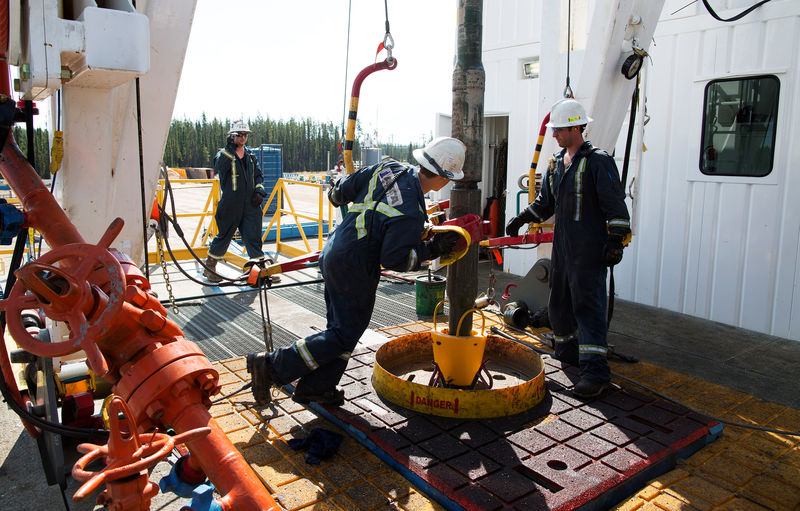Tonix Pharmaceuticals stock halted ahead of FDA approval news
By Barani Krishnan
Investing.com - Barely a week after appearing like they’d won the market back, oil bulls were licking their wounds on Thursday as crude prices tumbled for a third-straight day on concerns that sanctioned Iranian supplies might come roaring back.
New York-traded West Texas Intermediate crude, the U.S. benchmark blend, was down 66 cents, or 1.2%, at $55.09 per barrel by 1:15 PM ET (17:15 GMT) as OPEC’s vow to balance the market with supply cuts were trumped by fears there might be a resolution soon to the near-year-long U.S. embargo on Iranian crude.
London-traded Brent crude, the international benchmark blend, traded down 58 cents, or 1%, at $60.23 per barrel.
WTI and Brent have lost more than 5% each since Tuesday after the White House announced that U,S. National Security Advisor John Bolton, a long-time hawk on Iran, had left the Trump administration. Prior to that, the two benchmarks had gained about 7% each over a four-day rally helped by optimism about outsize weekly U.S. crude draws.
“After a very bullish oil inventory number, the market is now adjusting to the potential return of Iran to the global oil market,” Phil Flynn, analyst at the Price Futures Group in Chicago, said. There have been cumulative draws of nearly 22 million barrels in U.S. crude over the past three weeks.
News reports in recent days suggested that Bolton exited after President Donald Trump wanted to relax sanctions on Iran in order to work out a new nuclear deal that would allow the Islamic Republic to export its oil again in return for not developing atomic weapons.
The selloff in oil accelerated on Wednesday after French President Emmanuel Macron reportedly spoke on the phone with his Iranian counterpart Hassan Rouhani to discuss a nuclear deal to take to Trump. Macron has been acting as a go-between with Iran and the U.S.
With Rouhani due to attend the U.N. general assembly in New York beginning Sept. 25, speculation is rife that Trump wants to set up a meeting with him. Iranian officials have balked at the idea of what they called a photo-op for their leader with Trump, with Rouhani adding that he wouldn’t agree to any talks until sanctions were removed. Trump on Wednesday suggested he was open to that.
The White House has banned global trade of Iranian oil since November. Prior to the sanctions, Iranian oil exports peaked at about 2.8 million bpd in April 2018. Should the embargo be lifted, an additional 1 million barrels -- much of them in bonded storage in China or floating offshore -- could end on the global market quickly.
That’s not something welcomed by OPEC, which is trying to force its members, Iran one of them, to keep to a daily production cut of 1.2 million barrels.
Saudi Arabia's new energy minister Prince Abdulaziz bin Salman said on Thursday the kingdom would continue to overcomply voluntarily with oil output cuts agreed by the OPEC+ producer alliance that includes Russia.
OPEC, in its monthly report on Wednesday, forecast that demand for its own crude will average 29.4 million barrels per day in 2020, down 1.2 million bpd from this year. U.S. crude has become the No. 1 export competitor to OPEC oil this year, shipping a steady 3 million bpd or so in recent weeks.
Chairing a panel meeting of the OPEC alliance on Thursday, Prince Abdulaziz said Riyadh’s October production would be 9.89 million and that deeper output cuts would be discussed a OPEC’s regular meeting in November.
But oil traders took little comfort from those words, and rightly so, said Flynn, who pointed to the potential for under-compliance by alliance members such as Russia and Iraq.
“Bin Salman knows his main job is to get oil prices much higher,” Flynn said. “Neither President Trump’s softening on Iran, record U.S. exports nor Russia is making that easier.”
Further complicating the Saudis task, the Paris-based International Energy Agency again warned of a global oil glut on Thursday.
“In recent weeks, tensions in the Middle East Gulf have eased and oil industry operations appear to be normal,” said the IEA, alluding to the erasing of risk premiums and supply threats.
